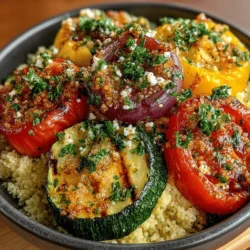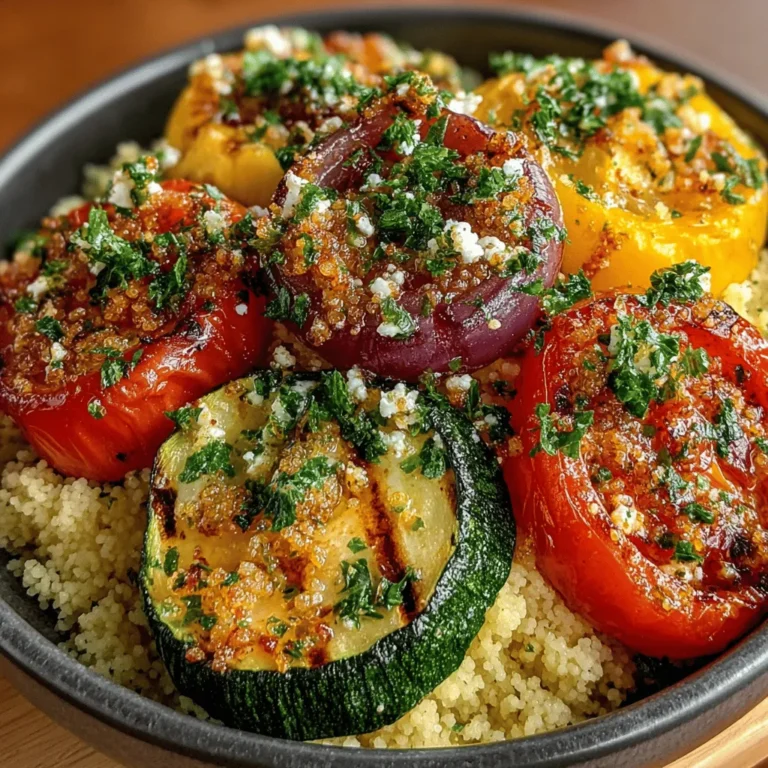In the realm of modern cuisine, few dishes can boast the versatility and appeal of a salad that marries grains, vibrant vegetables, and creamy cheese. Enter the Roasted Veggie & Feta Couscous Salad, a delightful culinary creation that stands out for its colorful presentation and rich flavors. This salad is more than just a dish; it embodies a lifestyle choice that embraces health, sustainability, and creativity in the kitchen. Whether served as a hearty side or a fulfilling main course, this salad caters to a variety of dietary preferences, making it perfect for any occasion—from casual family dinners to elegant gatherings.
With the rising popularity of plant-based meals, incorporating more vegetables into our diets has become a priority for many health-conscious individuals. This trend not only promotes better nutrition but also encourages a deeper connection to the food we consume. The Roasted Veggie & Feta Couscous Salad is a testament to this movement, showcasing how simple ingredients can come together to create a dish that is as nourishing as it is satisfying.
The Nutritional Benefits of Couscous and Vegetables
At the heart of this salad lies couscous, a versatile grain that serves as a fantastic base. Couscous is made from semolina wheat and is known for its light, fluffy texture, making it an ideal canvas for a variety of toppings. Packed with fiber and protein, couscous contributes to a balanced diet by promoting digestive health and keeping you feeling full longer. Each serving is a step toward achieving your daily nutritional needs, making it a smart choice for anyone looking to maintain energy levels throughout the day.
Complementing the couscous are a medley of roasted vegetables that not only add color but also a wealth of nutrients. Zucchini, bell peppers, red onions, and tomatoes combine to create a flavorful tapestry that is rich in vitamins and minerals. Zucchini offers hydration and is low in calories, while bell peppers are renowned for their high vitamin C content. Red onions bring a touch of sweetness and antioxidants, and tomatoes contribute lycopene, an important compound known for its potential health benefits. Together, these vegetables create a harmonious blend that elevates the nutritional profile of the salad.
Adding to this nutritional powerhouse is feta cheese, which provides a creamy texture and a tangy flavor that perfectly complements the roasted vegetables. Feta is a good source of calcium and protein, making it an excellent addition to a balanced meal. Its unique taste enhances the overall experience of the salad, allowing each bite to be a delightful exploration of flavors.
The Roasted Veggie & Feta Couscous Salad aligns seamlessly with contemporary healthy eating trends, encouraging the consumption of whole foods and plant-based ingredients. By focusing on fresh, seasonal produce, this salad not only supports local agriculture but also ensures that each ingredient retains its peak flavor and nutritional value.
Ingredients Overview
To create the Roasted Veggie & Feta Couscous Salad, you’ll need a selection of wholesome ingredients that each play a vital role in the dish’s overall taste and texture. Here’s a closer look at what you’ll need:
– Couscous: The foundation of the salad, couscous provides a light and fluffy texture that absorbs the flavors of the roasted vegetables and dressing. Its nutty flavor complements the other ingredients while adding essential nutrients like fiber and protein.
– Zucchini: This summer squash adds a mild sweetness and a satisfying crunch to the salad. Low in calories and high in water content, zucchini is a refreshing addition that helps balance the richness of the feta cheese.
– Bell Peppers: Available in a variety of colors—red, yellow, and green—bell peppers not only enhance the visual appeal of the dish but also contribute a sweet and slightly tangy flavor. They are also loaded with antioxidants and vitamins, making them a nutritious choice.
– Red Onion: With its sharp yet sweet flavor, red onion adds depth to the salad. When roasted, it caramelizes beautifully, enhancing its sweetness and bringing a savory element to the dish.
– Tomatoes: Juicy and flavorful, tomatoes bring brightness and acidity to the salad. They are packed with vitamins C and K, and their natural sugars balance the dish, making it more palatable.
– Olive Oil: A staple in Mediterranean cooking, olive oil is not just a cooking medium but a source of healthy fats. It enriches the salad with flavor and helps to enhance the absorption of fat-soluble vitamins from the vegetables.
– Feta Cheese: This crumbly cheese is the star of the show when it comes to flavor. Its creamy texture and tangy taste create a delightful contrast to the roasted vegetables, making each bite a flavorful experience.
– Fresh Parsley: Adding a pop of color and freshness, parsley is an herb that brightens up the dish. It also offers a range of vitamins and minerals, contributing to the overall health benefits of the salad.
– Lemon: A squeeze of fresh lemon juice ties the entire dish together, adding acidity and brightness that elevates the flavors. The zesty flavor cuts through the richness of the feta and olive oil, ensuring a well-balanced salad.
Using fresh, seasonal ingredients is crucial to achieving the best flavor and nutritional value in your Roasted Veggie & Feta Couscous Salad. When we choose local produce at its peak ripeness, we not only support sustainable agriculture but also enjoy a more vibrant and delicious dish.
Step-by-Step Guide to Making Roasted Veggie & Feta Couscous Salad
Now that you’re familiar with the ingredients and their benefits, let’s dive into the step-by-step process of creating this delightful salad.
Step 1: Preparing the Vegetables
Start by preheating your oven to 400°F (200°C). While the oven is heating, wash and chop your zucchini, bell peppers, red onion, and tomatoes into bite-sized pieces. Aim for uniformity in size to ensure even roasting. Spread the chopped vegetables on a baking sheet, drizzle them with olive oil, and season with salt and pepper. Toss to coat the vegetables evenly, ensuring they are well-seasoned.
Step 2: Roasting the Vegetables
Once the oven reaches the desired temperature, place the baking sheet in the oven. Roast the vegetables for about 20-25 minutes, or until they are tender and slightly caramelized. Roasting not only enhances the natural sweetness of the vegetables but also adds a depth of flavor that will elevate the entire salad.
Step 3: Cooking the Couscous
While the vegetables are roasting, prepare the couscous according to the package instructions. Typically, this involves bringing water or broth to a boil, then adding the couscous and covering it to let it steam for about 5 minutes. Once cooked, fluff the couscous with a fork to separate the grains and allow it to cool slightly.
Step 4: Combining the Ingredients
In a large mixing bowl, combine the roasted vegetables, cooked couscous, crumbled feta cheese, and chopped fresh parsley. Drizzle with a bit more olive oil and a generous squeeze of lemon juice. Gently toss the ingredients together until everything is well-distributed and coated.
Step 5: Serving
This Roasted Veggie & Feta Couscous Salad can be served warm, at room temperature, or chilled. It’s a versatile dish that can be enjoyed immediately or stored in the refrigerator for later. The flavors meld beautifully over time, making it an excellent option for meal prep or potlucks.
Stay tuned for the next part of the article, where we’ll explore variations of the Roasted Veggie & Feta Couscous Salad and tips for enhancing its flavor even further!
{{image_2}}
Preheat the Oven
Preheating your oven is a critical step in ensuring perfectly roasted vegetables. When you roast veggies, you want them to caramelize beautifully; this process begins at a temperature of around 400°F (200°C). This temperature allows the natural sugars in the vegetables to break down and develop a rich, sweet flavor while ensuring that the outside gets that desirable crispy texture. If you skip this step, you risk steaming the vegetables rather than roasting them, which can lead to a mushy texture and bland flavor.
Preparing the Vegetables
When it comes to preparing your vegetables, uniformity is key. Cut your vegetables into similar sizes to ensure they cook evenly. For this salad, consider using a mix of bell peppers, zucchini, red onions, and cherry tomatoes. Aim for pieces that are about 1 to 1.5 inches in size. This size allows for even cooking while still providing a satisfying bite.
Once cut, toss the vegetables with a drizzle of olive oil, salt, pepper, and your favorite herbs (such as thyme or rosemary) for added flavor. The oil helps facilitate roasting and prevents sticking, while the herbs will infuse the veggies with aromatic goodness.
Roasting the Vegetables
Spread your seasoned vegetables in a single layer on a baking sheet lined with parchment paper. This technique promotes even roasting and minimizes the risk of steaming. Roast your vegetables in the preheated oven for about 25-30 minutes. Keep an eye on them; you want to roast until they are tender and the edges are slightly charred, which enhances their sweetness and adds depth to the overall flavor profile.
Halfway through roasting, give them a little stir to ensure they brown evenly. If you notice that some vegetables are cooking faster than others, you can remove them earlier to avoid overcooking.
Cooking the Couscous
Couscous is a fantastic base for your salad due to its light texture and ability to absorb flavors. To prepare it correctly, bring two cups of water or vegetable broth to a boil. Add a pinch of salt for flavor and then stir in one cup of couscous. Turn off the heat, cover the pot, and let it sit for about 5 minutes. This method allows the couscous to steam and absorb the liquid, resulting in perfectly fluffy grains.
For added flavor, consider cooking the couscous in a mixture of water and vegetable broth, or even adding a splash of lemon juice during cooking for an extra zing.
Fluffing the Couscous
After the couscous has rested, it’s crucial to fluff it up before incorporating it into your salad. Use a fork to gently rouse the grains, which helps to aerate them and prevents clumping. This step is essential for achieving a light and fluffy consistency, making it more enjoyable to eat and ensuring it mixes well with the roasted veggies and feta.
Combining Ingredients
When it’s time to combine the roasted vegetables with the couscous, do so gently. Start by placing the couscous in a large mixing bowl, then add the roasted vegetables on top. Crumble your feta cheese over the mixture, and using a spatula, fold the ingredients together carefully. The goal is to combine the flavors without breaking apart the roasted vegetables or crumbling the feta too much.
If you like, add a handful of fresh herbs, such as parsley or basil, at this stage for an extra layer of freshness and color.
Garnishing
A well-garnished dish not only enhances visual appeal but also adds extra flavor dimensions. Consider garnishing your roasted veggie and feta couscous salad with toasted pine nuts or sunflower seeds for a delightful crunch. A sprinkle of freshly cracked black pepper and a drizzle of good-quality olive oil can elevate the dish, making it even more inviting.
When serving, choose a wide, shallow bowl or a rustic wooden platter to showcase the vibrant colors of the salad. A bright serving dish can make even the simplest salads look gourmet.
Flavor Profile and Versatility of the Salad
This roasted veggie and feta couscous salad achieves a fantastic balance of flavors. The savory notes from the roasted vegetables complement the tangy creaminess of the feta cheese, while fresh herbs introduce an invigorating element. The couscous serves as a neutral base, allowing the flavors to shine without overwhelming the palate.
One of the standout features of this dish is its versatility. It can be enjoyed as a main dish, especially with added protein like grilled chicken or chickpeas, or as a side dish alongside grilled meats or fish.
Feel free to experiment with different vegetables based on what’s in season or what you have on hand. Carrots, asparagus, or even Brussels sprouts can work beautifully. You can also switch up the grains; quinoa or farro are excellent alternatives that add their unique textures and flavors.
Serving Suggestions and Presentation Ideas
This salad is delightful served warm, at room temperature, or even chilled, making it a great option for picnics or potlucks. If you’re serving it as a main course, consider adding a protein like grilled shrimp or chickpeas for a filling meal.
In terms of presentation, use vibrant bowls or platters that enhance the colorful ingredients of the salad. Layer the ingredients in a way that showcases the various textures—think about the contrast of the crispy veggies against the fluffy couscous and creamy feta.
For an extra touch, consider pairing your salad with a light, citrusy dressing on the side. A simple vinaigrette made with olive oil, lemon juice, and a hint of Dijon mustard can be a refreshing addition.
Complement your salad with side dishes such as a simple green salad, roasted sweet potatoes, or a light soup. For beverages, a crisp white wine or sparkling water with a slice of lemon would pair wonderfully.
Conclusion
The Roasted Veggie & Feta Couscous Salad is not only a feast for the eyes but also a delicious, nutritious option that brings a wealth of flavors and textures to your meal. With the combination of caramelized vegetables, fluffy couscous, and tangy feta, this recipe is a crowd-pleaser perfect for any occasion.
Embrace the ease of preparation and the joy of using fresh ingredients, and don’t hesitate to experiment with different vegetables or grains to make this dish your own. Whether served as a vibrant main course or a colorful side, this salad is sure to impress both family and friends. So gather your ingredients, fire up that oven, and enjoy the delightful experience of creating a dish that’s as wholesome as it is delicious.


